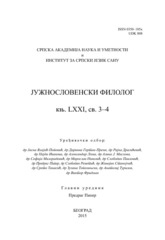Приказ основних података о документу
О каузално-импликативним односима у српској хипотакси : комплекс условљених зависносложених реченица
Causal-Implicative Relationships in the Serbian Hypotaxis : Complex of generative complex sentences
| dc.creator | Војводић, Дојчил П. | |
| dc.date.accessioned | 2019-10-04T11:24:03Z | |
| dc.date.available | 2019-10-04T11:24:03Z | |
| dc.date.issued | 2015 | |
| dc.identifier.issn | 0350–185x | |
| dc.identifier.uri | https://dais.sanu.ac.rs/123456789/6427 | |
| dc.description.abstract | У раду се (на материјалу савременог језика) разматрају им пли кативни односи у српској хипотакси. Посебна пажња обраћа се на субординативне (каузално-импликативне) односе антецедента и консеквента у рашчлањеним (биситуативно-асиметричним) зависносложеним реченицама са условљеном (узрочном, посљедичном, циљном, погодбеном и допусном) семантичком структуром. Поред интерпретације основних ком поненти семантичких инваријанти категорије условљености (која се одликује разновсрном, категоријално-диференцијалном семантиком), до датно се анализирају аспектуално-темпоралне корелације (таксисне си туације симултаности и сукцесивности) предиката главне реченице и кла узе погодбених реченица с обзиром на њихов хипотетички карактер, ко ји се реализује као реална (‘ако заиста’), евентуална (‘ако случајно’/ ’ако се покаже’), потенцијална (‘ако можда’) и иреална (‘ако уопште’) модалност. Такође се шире проблематизује и категорија концесивности, која, поред асиметричних параметара „двојаке оријентације“, односно прин ципа тзв. „изневјереног очекивања“ (јер се моделу уобичајених логичких односа супротставља реална чињеница – радња-посљедица као актуелни, постигнути резултат који демантује очекивану посљедицу – радњу као априорни, претпостављени резултат), садржи и основне компоненте карактеристичне и за категорију евиденцијалности, као и за категорију епистемичке модалности. На крају се даје и краћи преглед лингво статистичких података (фреквенције) добијених анализом једног спе цифичног дискурса (садржаног у Новом завјету) чија је синтакса широко заснована на каузално-импликативним хипотаксичким односима. | sr |
| dc.description.abstract | The paper analyzes the causal-implicative relationships in the segmented complex sentences with a “closed” (asymmetric, mandatory bi-situational) generative (conditional) semantic structure on the corpus of the Serbian language. The generative (conditional) semantic structure consists of meaningfully interconnected antecedents and consequents that are based on the principle of subordination. These sentences are characterized with a general causal link due to the specific implicative relationship between the segments that can be realized within dependent clauses with diverse categorically-differential semantics (i.e. causal, consecutive, final, conditional and concessive). The author reaches a conclusion that the given implicative relationships (P ⇒ Q, P ⇐ Q/Q ⇒ P, P ⇔Q, P ⇒ Q´ Δ P´ ⇒ Q) represent, in fact, semantic invariants of generative complex sentences. It is pointed out that the structure, formation and functioning of these relationships (sentences) are always determined by the interconnectedness of syntax and lexicon. They are based on a general causal adverbial meaning of the conjunctions in a subordinate clause, which are also used to determine the adverbial semantics of a sentence as a whole. The article discusses in particular the aspectual-temporal correlations that are realized in complex sentences with a generative structure. It has been noted very often in the literature that there is no differentiation made among all of the types of the hypothetical conditionality – real, eventual, potential and unreal. The paper analyzes taxis of simultaneity and succession (anteriority/posteriority) of the main and subordinate clause predicates in conditional sentences as a special type of the relative-temporal relationships within the same temporal plan. In order to interpret these correlations, the Serbian data was compared to the data in Russian and Polish. It is noted that the Northern Slavic languages (in this case Russian and Polish) are unable to distinguish real from eventual conditionality because they, unlike the Serbian language, do not have formal (grammatical) means for delimitation between different types of hypothetical modality. In other words, the perfective present in the Serbian language, which in conditional sentences formally coincides with the Northern Slavic perfective future (which is the same as analytical, imperfective, future, used in those languages in both the main and the subordinate clauses of the conditional sentences), can never signify real conditionality, but only an eventual one. In addition to this, the Serbian language in order to express eventual conditionality in subordinate clauses uses future II (exact) as well. Therefore, based on a short contrastive analysis of the material, it can be concluded that the inventory of resources used to express these types of modal hypothetical relationships is much richer in the Serbian language than it is in Russian or Polish. In relation to this, it is pointed out that the abovementioned specific features of the compared languages represent a typological boundary between the Southern Slavic and Northern Slavic languages. Likewise, the paper analyzes in a detailed manner complex concessive sentences with an emphasis on their semantic interpretation. This interpretation implies primarily ascertaining the basic components of the semantic invariant of the concession category, as well as an explanation of the principle of “unfulfilled expectations”, i.e. an implicit cause which enables the subject to unexpectedly overcome or fail to overcome an obstacle, which is precisely what concessive relationships are built on. In this regard, it can be noted that concessive relationships are closely associated with categories of evidentiality and epistemic modality, which is, in principle, the result of a mandatory, although, as a rule, formally inexplicit presence (participation) of the addresser (speaker) in the organization of given relations. In this way, “modus-dictum” relationships are realized in concessive sentences, because in a certain sense a subordinate clause (with a propositional frame – modus) interprets the contents of a main clause (proposition – dictum). The author emphasizes a special role of a referral (either explicit or implicit) to the source and credibility of the information communicated by the addresser, whereby the source can be presented by both observations and gained experience of the addresser (direct evidentiality) as well as other people, or logical reasoning which is based on his/her own beliefs and assumptions (indirect evidentiality). Statistical analysis of a frequency of conjunctions (and thus the sentences as well) with generative semantics in the concluding section of the article allows the author to conclude that certain types of texts – in this particular case the texts are represented by the New Testament discourse – are characterized precisely by the causal-implicative orientation of the hypotaxis, because more than 1/3 of a total text of the four gospels uses precisely sentences with a causal meaning. The author concludes that this result confirms further that the causal- implicative syntactic structures considered in this article demand further, even deeper, research. | en |
| dc.language.iso | sr | sr |
| dc.publisher | Београд : Институт за српски језик САНУ | sr |
| dc.publisher | Београд : Српска академија наука и уметности | sr |
| dc.relation | info:eu-repo/grantAgreement/MESTD/Basic Research (BR or ON)/178021/RS// | sr |
| dc.rights | openAccess | sr |
| dc.rights.uri | https://creativecommons.org/licenses/by-nc-nd/4.0/ | |
| dc.source | Јужнословенски филолог | sr |
| dc.subject | хипотакса | sr |
| dc.subject | гипотаксис | sr |
| dc.subject | hypotaxis | sr |
| dc.subject | каузално-импликативни односи | sr |
| dc.subject | класификација и типологија зависносложених реченица | sr |
| dc.subject | нерашчлањене vs. рашчлањене реченице | sr |
| dc.subject | корелативне и детерминативне реченице | sr |
| dc.subject | условљене (узрочне, посљедичне, циљне, погодбене, допусне) реченице | sr |
| dc.subject | антецедент и консеквент | sr |
| dc.subject | хипотетичка (реална, евентуална, потенцијална, иреална) модалност | sr |
| dc.subject | конверзивна асиметрија | sr |
| dc.subject | принцип „изневјереног очекивања“ | sr |
| dc.subject | таксис и релативно вријеме | sr |
| dc.subject | евиденцијалност | sr |
| dc.subject | епистемичка модалност | sr |
| dc.subject | српски језик | sr |
| dc.subject | causal-implicative relationships | sr |
| dc.subject | classification and typology of complex sentences | sr |
| dc.subject | segmented vs. non-segmented sentences | sr |
| dc.subject | correlative and determinative sentences | sr |
| dc.subject | generative (causal, consequential, final, conditional, concessive) sentences | sr |
| dc.subject | antecedent and consequent | sr |
| dc.subject | hypothetical (real, eventual, potential, unreal) modality | sr |
| dc.subject | conversive asymmetry | sr |
| dc.subject | “unfulfilled expectation” principle | sr |
| dc.subject | taxis and relative time | sr |
| dc.subject | evidentiality | sr |
| dc.subject | epistemic modality | sr |
| dc.subject | Serbian language | sr |
| dc.subject | каузально-импликативные отношения | sr |
| dc.subject | классификация и типология сложноподчиненных предложений | sr |
| dc.subject | расчлененные vs. нерасчлененные предложения | sr |
| dc.subject | коррелятивные и детерминативные предложения | sr |
| dc.subject | обусловленные предложения | sr |
| dc.subject | антецедент и консеквент | sr |
| dc.subject | гипотетическая (реальная, эвентуальная, потенциальная, ирреальная) модальность | sr |
| dc.subject | конверсивная асимметрия | sr |
| dc.subject | принцип „обманутого ожидания“ | sr |
| dc.subject | таксис и относительное время | sr |
| dc.subject | эвиденциальность | sr |
| dc.subject | эпистемичекая модальность | sr |
| dc.subject | сербский язык | sr |
| dc.subject | причины | sr |
| dc.subject | следствия | sr |
| dc.subject | цели | sr |
| dc.subject | условия | sr |
| dc.subject | уступки | sr |
| dc.title | О каузално-импликативним односима у српској хипотакси : комплекс условљених зависносложених реченица | sr |
| dc.title | Causal-Implicative Relationships in the Serbian Hypotaxis : Complex of generative complex sentences | en |
| dc.type | article | sr |
| dc.rights.license | BY-NC-ND | sr |
| dcterms.abstract | Vojvodić, Dojčil P.; O kauzalno-implikativnim odnosima u srpskoj hipotaksi : kompleks uslovljenih zavisnosloženih rečenica; | |
| dc.rights.holder | Институт за српски језик САНУ | sr |
| dc.citation.spage | 121 | |
| dc.citation.epage | 186 | |
| dc.citation.volume | 71 | |
| dc.citation.volume | 3-4 | |
| dc.identifier.doi | 10.2298/JFI1504121V | |
| dc.type.version | publishedVersion | sr |
| dc.identifier.fulltext | https://dais.sanu.ac.rs/bitstream/id/25903/vojvodic.hipotaksa.2015.pdf | |
| dc.identifier.rcub | https://hdl.handle.net/21.15107/rcub_dais_6427 |
Документи
Овај документ се појављује у следећим колекцијама
-
Јужнословенски филолог / Južnoslovenski filolog
ISSN 0350-185X; eISSN 2406-0763

